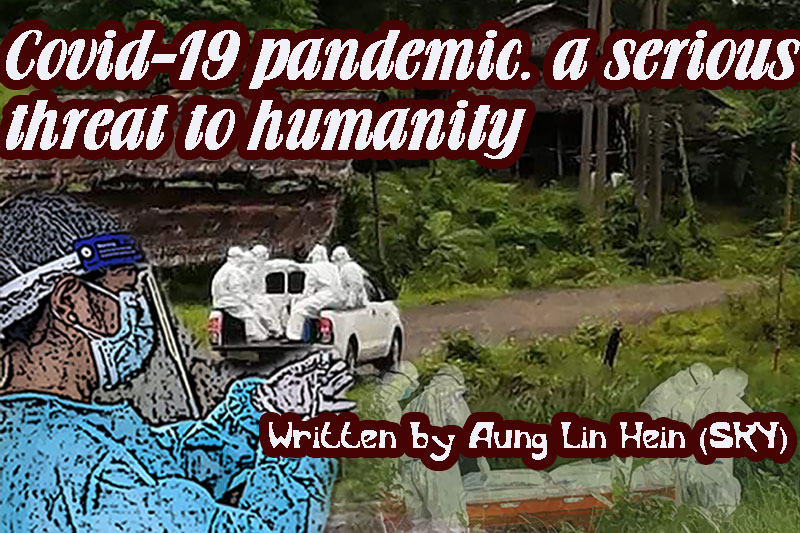- Junta launches major offensive to retake strategic Mawchi mining town
- Extreme poverty drives Sittwe residents to dismantle abandoned houses for income
- Weekly Highlights from Arakan (Feb 23 to March 1, 2026)
- Over 300 political prisoners freed from 10 prisons nationwide
- DMG Editorial: Between War and Opportunity - A New Border Reality for Bangladesh and Arakan
Covid-19: A Grave Threat to Humanity
The coronavirus, which originated in Wuhan, China, has been threatening people around the world since December 2019. Humanity has not yet been able to defeat the virus, which invades the respiratory system, attacks the lungs and takes lives.
29 Aug 2021

Written by Aung Lin Hein (SKY)
The coronavirus, which originated in Wuhan, China, has been threatening people around the world since December 2019. Humanity has not yet been able to defeat the virus, which invades the respiratory system, attacks the lungs and takes lives.
World powers such as the United States, the United Kingdom, Italy and other European countries have suffered casualties since the first wave of the virus. Developed countries’ advanced healthcare systems, administrative machinery and technology have not been able to withstand this virus. Despite the efforts of health workers and medical professionals, the virus has claimed more than 4 million lives globally. The impact of the first wave of the virus was so severe that it forced Europeans to suspend business operations and disrupted football matches.
During the second wave, the viral hot spots shifted, with Brazil and other South American countries hit hard. Unfortunately, Arakan State faced the second wave amid an ongoing armed conflict between the military and Arakan Army (AA). Surprisingly, the second wave of the Covid-19 pandemic faded between the November 8 general election and the military coup in early February.
Then came the third wave, with Myanmar, India and Indonesia among the worst affected. The surge in virus infections has exposed serious oxygen supply problems in Myanmar, and many have died as a result. The country’s political and financial crises have exacerbated the plight of the people, who have struggled to withdraw their money from banks and make ends meet.
Family members, relatives, friends, acquaintances, celebrities, ordinary people, and monks succumb to the virus every day. No ethnic group or occupation is spared.
During this time many of my acquaintances have died of the virus. Once I open social media, I have to write a lot of messages saying, “Rest in Peace,” “Good luck,” and “Wish you a speedy recovery!”
The only way to continue our lives is to avoid the virus, which seeks to stifle people’s lifestyles on a daily basis. At some point, the virus may find us. Depending on how good one’s resistance is, one can survive. Doctors say the virus is particularly threatening to obese people, people with high blood sugar, people with allergies and people with a weakened immune system.
When the virus infects people, it can make breathing difficult, and so-called “long Covid” has impacts for months or longer. We still do not fully know what long Covid entails.
Because the virus spreads by human-to-human transmission, we need to limit our social interactions. People were negligent in the first and second waves of the virus, but in the third wave, they are more likely to be infected due to the increased contagiousness of the Delta variant.
In fact, the third wave of the Covid-19 pandemic has been raging for months in neighbouring India, Bangladesh and Thailand. I think the government has not been able to cope with the third wave of the virus due to the political and economic turmoil in Myanmar.
For the people experiencing these twin political and economic crises, another catastrophe was not expected to come so quickly. Hundreds of people have been dying from the virus in India every day for months, and scores daily in Bangladesh too. Perhaps we feel blindsided by this third wave because we were focused on domestic political issues.
The United League of Arakan (ULA) has issued a stay-at-home order in Arakan State, describing it as a local anti-virus emergency response. The Arakan Army chief estimated that 75% of Arakanese people adhered to the order. In the weeks since the ULA announced that Arakanese people should stay at home, the number of deaths and infections in Arakan State has dropped significantly. As of August 24, Arakan State had reported 362 deaths from the third wave of Covid-19. Though the number of deaths due to the virus has been declining in Arakan State, it cannot be ignored.
For those who have enough money, staying home is doable, but for the poor, the virus is like an unavoidable demon during the Covid-19 period. For now, getting vaccinated is the best solution, but it is not a realistic option for most Myanmar people over the next few months at least. Until then, wearing masks, washing hands, avoiding crowds, and other health-conscious behaviour must continue to be an everyday part of our lives.








.jpg)











